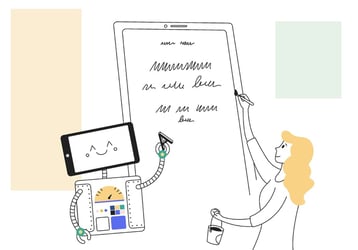It doesn't matter what industry you work in, or what your job title is – you probably write copy for customers and colleagues. It can be as simple as an email or letter, or as complex as product descriptions or web copy.
To go from good to great, you may need a professional writer (ahem!) but to avoid looking bad, watch out for these common writing mistakes:
- Incorrect spelling. It's not hard to learn how to edit. With spell-check software and Google, it's much easier to spot and correct spelling mistakes. This is good because they undermine your credibility.
- The wrong word. Software alone will not find every mistake: it will not tell you if you have written their instead of there, or mad instead of made. Read through your copy and watch out for typos and homophones (words that sound the same but are spelt differently). Or, better, get someone else to proofread it.
- Changing tense. Be consistent. Pick a tense and stick with it. (The past, the present and the future walked into a bar. It was tense.)
- Affect / effect. Don't confuse the two. Affect is a verb, a doing word, meaning to influence or alter. Effect is a noun, the name of something, meaning the change that has happened as a result of an action or other cause.
- Apostrophes. Only use an apostrophe to show ownership: “Clare’s informative article” or missing letters: “I haven’t read it.”
- Its / It’s. While we’re on apostrophes, this case deserves its own point because it’s such a common mistake. Its denotes ownership, for example: “I don’t like its (the carpet’s) colour. Whereas, it’s is an abbreviation of it is, for example: “It’s a lovely carpet.”
- Txt spk. Never abbrevi8 wrds the way u might on a txt msg. It’s hard to read. Apart from common abbreviations like CD or PC, avoid acronyms too if possible. You may think it’s professional to use the jargon of your industry but the odds are you’ll just make it harder for your readers to understand what you’re trying to say.
- Passive voice. If you can add ‘by zombies’ to your sentence and it still makes sense, then you have the passive voice. Mistakes were made (by zombies). The passive should be avoided (by zombies).
- Long words. Try to write the way you speak and don’t overuse the thesaurus. Long words make your writing harder to understand and, as a recent study demonstrated, they make you look less clever not more so. Short words are best.
- Formality. Too many people think that writing like a professional means writing in an extremely formal way, like a contract. Wrong! It’s okay to talk to your reader directly. It’s fine to abbreviate phrases like it is (it’s) and cannot (can’t). Feel free to use the first person: I and we. For example, it may sound more professional to say “the company recommends that users upgrade their software” but it’s actually more effective to say “we recommend that you upgrade.”





